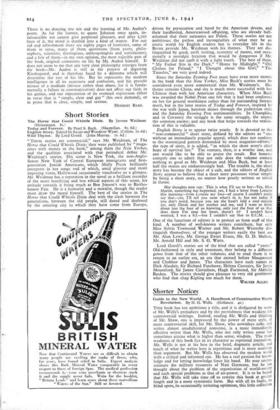Short Stories
The Horse that Could Whistle Dixie. By Jerome Weidman (Heinemann. 8s.)
" THESE stories are commercial," says Mr. Weidman, of The Horse that Could Whistle Dixie; they were published by " maga- zines with money in the bank," among them the New Yorker, and the qualities associated with that periodical define Mr. Weidman's stories. His scene is New York, the non-Anglo- Saxon New York of Central European immigrants and first- generation Jewish Americans, which Molly Picon brilliantly interprets in her songs and of which, amid glossier and more imposing vistas, Hollywood occasionally vouchsafes us a glimpse. Mr. Weidman has a reputation in the novel as a brilliant recorder of the more horrifying and less ethical aspects of this scene, his attitude towards it being much as Ben Jonson's was to Bartho- lomew Fair. He is a humorist and a moralist, though the reader must draw the moral himself. The best of the stories in The Horse that Could Whistle Dixie deal with the clash between the generations, between the old people, still dazed and deafened by the amazing city to which they have come from Europe, driven by persecution and lured by the American dream, and their hardboiled, Americanised offspring, who are already half- ashamed that their surnames are Polish. These stories are not ambitious; the pathos and incongruities of what may be an exotic world for English readers but is everyday life in the Bronx provide Mr. Weidman with his themes. They are dis- tinguished by good, swift writing, economy of means, and occa- sionally a nostalgic lyricism that would be dangerous if Mr. Weidman did not curb it with a light touch. The best of them, " My Father Sits in the Dark," " Home by Midnight," " Old Clothes for Poland," " I Thought about this Girl," " The Tuxedos," are very good indeed.
Since the Saturday Evening Post must have even more money in the bank than the New Yorker, Miss Buck's stories must be considered even more commercial than Mr. Weidman's. Her theme remains China, and she is much more successful with her Chinese than with her American characters. When Miss Buck was awarded the Nobel Prize- one felt that it had been conferred on her for general worthiness rather than for outstanding literary merit, but in the later stories of Today and Forever, inspired by the war with Japan, heroism shines through the pedestrian style and the Saturday Evening Post sentimentalities. In Chungking and in Coventry the struggle is the same struggle, the enemy the common enemy; and any book that helps towards the realisa- tion of this is valuable.
English Story is to appear twice yearly. It is devoted to the " non-commercial " short story, defined by the editors as " one without an immediately popular appeal, which does not conform to the stereotyped pattern demanded by most magazine-editors," the type of story, it is added, " in which the short story's chief hope of survival lies." The venture, then, is a worthy one, and one would like to be able to praise the result. But honesty compels one to admit that not only does the volume contain nothing as good as Mr. Weidman and Miss Buck, but at least half the stories are embarrassingly bad. The trouble is, the short story has become the object of a cult, and the editors of English Story appear to believe that a short story possesses virtue simply by being a short story, no matter how poorly written or trivial in theme.
Her thoughts now ran: This is what I'll say to her—Yes, Miss Martin, something has happened, yes, I had a letter from Loraine this morning—from Loraine my love—of course I couldn't really say that—yes, I'll tell you soon what's in it, but not today if you don't mind, because you see she hasn't told a soul outside yet, only Derek and her mother and me, and I want to think about just the four of us knowing, only just the four of us that does show I'm near her heart, doesn't it? I needn't have worried, I was a b.f.—but I couldn't say that- to E.C.M. . . .
One of the functions of editors is to protect us from stuff of this kind. A number of well-known writers contribute, but only Miss Sylvia Townsend Warner and Mr. Robert Westerby dis- tinguish themselves; of the younger writers easily the best are Mr. Alun Lewis, Mr. George Ewart Evans, Mr. G. D. Skelton, Mr. Arnold Hill and Mr. S. G. Watts.
Lord Gorell's stories are of the kind that are called " yarns." Old-fashioned in style and treatment, they belong to a different genre from that of the other volumes; and to read them is to return to an earlier era, an era that existed before 'Maupassant and Chekhov and James. The characters have such names as Dick Alasdair, Sir Richard Fanshawe, Helena Carstairs, Sir Jervis Mountford, Sir James Carruthers, Hugh Farimond, Sir Melville Bardon. The stories should give pleasure to very old gentlemen who find that chap Kipling too much for them.
WALTER ALLEN.


























 Previous page
Previous page